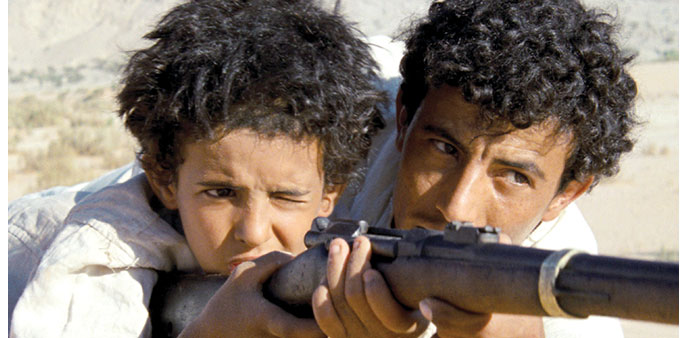By Anand Holla
At the ongoing 71st Venice International Film Festival, Jordanian director Naji Abou Nowar’s Theeb, a Bedouin Western shot in the deserts of Jordan with real Bedouins, is fetching heaps of praises.
The 100-minute coming-of-age drama, supported by the Doha Film Institute (DFI), is headlining Arab cinema at the Venice Film Festival. As part of Spring Grant 2013, the DFI backed Nowar’s debut feature, and it was also supported by Sanad, the development and post-production fund of the Abu Dhabi Film Festival.
Theeb (which means wolf in Arabic), which is now fuelling conversations in the movie festival circuits, has been selected for the Orizzonti competition section of the Venice Film Festival.
During World War I, a young Bedouin boy Theeb, in the Ottoman province of Hijaz, has to make sense of a hurried coming-of-age experience when he sets off on a dangerous desert trip to guide a British officer to his secret destination.
Set in 1916, the story follows Theeb and his elder brother Hussein living with a Bedouin tribe in an area that is now part of Northern Saudi Arabia. While Theeb learns lessons on daily survival from Hussein after the death of their father, the two are oblivious to the historic battles being waged around their world – the First World War raging in Europe, the Ottoman Empire falling apart, the emergence of the Great Arab Revolt, and the British officer T E Lawrence’s plan with the Arab Prince Faisal to establish an Arab kingdom.
The film’s synopsis explains, “When British officer Edward and his Bedouin guide Marji stumble wayward into their tribe’s camp, the two brothers’ destiny is forever changed. Abiding by the Bedouin custom that guests cannot be refused aid, Hussein is assigned to accompany the two strangers to their destination — with the uninvited Theeb, eager for adventure, following close behind.”
“The ensuing journey, filled with danger and hardship, will result in Theeb’s greatly hastened maturation in a culture where a man’s honour and righteousness determines his inclusion or expulsion from the community,” adds the synopsis.
Made with a small crew, a modest budget and a cast full of non-professional actors from one of the last of Jordan’s nomadic Bedouin tribes to settle down, Nowar’s well-received film will soon be screened at the Toronto International Film Festival as well.
Nowar, who studied screenwriting at the Sundance Institute Lab’s first Middle East programme in Jordan, has shot the film entirely on location against the stunning landscape of Wadi Rum and Wadi Araba. The idea was to blend Bedouin tribal culture and Western ideas and concepts.
In an interview to Variety over the film’s premiere at Venice, Nowar explains, “I immediately liked 1916 and the great Arab Revolt (against the Ottoman Empire) because it had many similarities to the great Westerns. It’s a different tone, but if you look at the Sergio Leone movies or John Ford’s The Searchers, it’s a time of great change, a very turbulent time. That’s what really interested me, telling the story of what happened to the Bedouins. Because their culture is killed after that. The actors in the film are the last Bedouins to be born as nomads. That’s why we chose them.”

